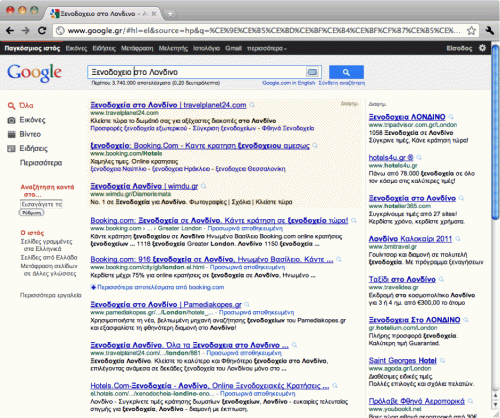Looking at the primary findings of a recent hotel online market research we conducted, it became somewhat obvious that multilingual international travellers are not “chased” by hoteliers. Unlike the occasionally surprising proficiency one can find in a hotelier’s online strategy when it comes to same-language markets, international source markets are – to put it mildly – mostly ignored. This suggests a significant opportunity for hotels, in the form of what is – in every way that counts – a “new” marketplace; one in which linguistic barriers have so far kept the competition away!
If you are a hotelier, think of your PPC and SEO efforts… do you think you are selling to the Japanese in the same way that you are selling to the Brits? I am afraid that unless you KNOW the answer to be “yes”… you aren’t.
Although this changes dramatically from market to market, the rule of thumb for the top city destinations around the world seems to be that a disproportionally low number of hotels chase international business.
For such markets (think London, New York, Chicago, Miami, Paris, Munich etc.) this imbalance is presenting us with an interesting dynamic of supply and demand. On the one hand we have some finite and proportionately small – and (in most western countries) fairly accurately measured – demand for local accommodation from international markets. On the other hand, we have a very low number of hotels that appear to be interested in, and actively trying to reach, international markets. There also seems to be a very clear divide between large international chains and independent hotels – irrespectively of the standing or reputation of the properties in question.
It would be somewhat impolite for me to point to any specific properties here. But, to get an idea of the point that I am trying to make without naming any names, think of the 5 independent quality hotels in London that spring to your mind. Find them in Google and see if you can find any languages there… Now, I know they have their reasons for this – maybe they really don’t need any more business directly to their website – at least not at an additional cost. However, the conclusion (which will be visited again further down in this entry) is clear. If you want to stay in one of those hotels, and you happen to come from Japan, you pretty much have to find and book this hotel via an agency.
Now, it is personally important to me to mention here that the more I study, the more suspicious I grow of statistics and evidence. However, I have to agree that the figures available to us suggest a staggering opportunity for independent hoteliers, in the international/multilingual markets as a whole. In the case of certain cities with strong international demand, only those hotels that can speak the customer’s language (literally) have the chance to attract international traffic directly to their own website. The rest, don’t.
You Are Not Alone
Figures for international inbound travel to the UK are readily available for anyone with an interest in accessing them. One of my favourite sources is www.visitbritain.org who frequently update their figures and implicitly remind us of the magnitude of the opportunity in the international traveller. A good summary of the latest update on international tourism facts can be found straight on their website here (http://www.visitbritain.org/insightsandstatistics/inboundtourismfacts/index.aspx).
Some of the quoted figures are truly staggering. Almost 30 million visitors in 2010 have generated almost 16.9 billion pounds in revenue to the country, and certain key performance indicators have pretty much stayed the same over the last four years – despite the rare turmoil in the international and domestic markets since 2008. More than half of those visitors (52%) were visiting London.
The Language Mosaic
There is no escaping that we live in a multicultural, multilingual world. The consequential complexities and inconsistent (and even incompatible) patterns of consumer behaviour between the various international markets make marketing to such an international audience a seriously complex affair. The very simple fact that a hotel is ideally trying to sell the same room to anyone in the world who potentially wants to come to the area, makes it all more tricky than we would ideally like it to be.
However, and as it often happens with similar populations, there are some demand patterns that can make our lives a little easier…
The – almost – 80/20 rule
It turns out that almost 70% of all international visits in 2010 happened from the top 10 source countries (only 10% of the countries that have direct flights to Britain). The top ten in terms of market volume and spent can be seen in the table below:
We also know that not all visitors behave the same way. The reasons behind travelling (e.g. VFR vs. Business Travel), the age of the visitor, as well as the source country itself can make a great difference in the suitability of a traveller for any particular hotel.
Furthermore, from a linguistic point of view (and despite that with the exception of two English-speaking countries (USA and Australia) all other top 10 source countries (by volume) are within Europe) the complexity that we are faced with isn’t too scary…
The Big Four
Looking at the table above, and making the assumption that all the Dutch visitors speak English (I have yet to come across a Dutch person that doesn’t speak English better than I do) leaves us with four major foreign language “powered” contributors to inbound international travel in the UK. France, Germany, Spain and Italy. These four countries alone represent exactly one third of all the international visitors that came to the UK in 2010!
Lost in Translation?
According to eye4travel (2008) some 70% of all internet users don’t speak English at all, or are uncomfortable using it for transactions… this is obviously a figure that refers to everyone with a computer and an internet connection, and we would be dishonest with ourselves if we didn’t assume that international travellers are more likely to speak English than the average user. Yet, the significance of language barriers is pretty evident from that figure – 70% is a high number in any language, and so is 60% or even 50%.
In any case, I believe that there are only two significant questions to be asked by any hotelier trying to increase its direct traffic.
1. “Do I think that international travellers understand my site when they visit it?“
Before anyone raises their hand to talk about Google Translations and risk giving me an aneurysm (however brilliant and useful their translations tools are) I would like to ask you the even more pertinent and logically preceding question:
2. “Do you think that travellers from abroad are actually able to find you online, in order to have the opportunity to try and understand what you are selling to them?”
…..
Even if it were only a minority of international inbound travellers that didn’t speak English (and it isn’t), them being unable to find your website in the first place is – I am sure you would agree – a major issue!
If you are a hotelier and you’re are reading this, the chances are that you are already doing some SEO and PPC for your website. Also, the chances are that you are NOT doing SEO or PPC for your German, French, Japanese etc. potential customers. Hilton is, Marriot is, and crucially Expedia, LastMinute and Bookings do (have a look at the Google screen captures below).
At eHotelworks, when we were thinking of offering the BABEL Multilingual product, we run multiple search tests from several countries for multiple types of hotels, using a variety of languages and IP locations (in other words we were pretending we were searching for UK hotels from abroad).
The results were really fascinating. From certain countries (most clearly show in Holland than anywhere else) the evident problem of being found appeared to be little. In Dutch searches, hotels without international languages on their sites produced mixed results (and much better than we expected).
It seems that the Dutch’s ability to speak perfect English has permeated Google’s results. A lot of hotels – especially in what we call “narrow” searches (e.g. “hotel name” and “location” were used as search terms) – did come up in the first pages, no problem.
On the other extreme, in countries and languages where English is not a prominent language or the language has a significantly different alphabet (Japanese, Arabic, etc.) no searches gave us any independent hotel results at all. Even when we were looking for hotels by their exact name and location, only agencies came back with results. Fascinatingly, Bookings.com – presumably through their very popular xml feed based service – seemed to power the staggering majority of results in the more obscure source markets (such as Greece in the example below).
Have a look at the example of two searches (used the keywords “hotel in London”) here:
First, from England, in English

Even for the traditionally expensive keywords "hotel in London" there is a multitude of hotels having their direct links seen. Especially in the Local Results section.
Then from Greece, in Greek

You don't have to speak Greek to notice that there are NO results, either organic or paid for, which belong to a hotel. The OTAs have the opportunity to rule the first pages of Google. Even the mighty Marriott and Hilton of this world have to give those bookings away to OTAs.
The inability of hotelier to market to the many – and obscure – international languages is arguably – and at least in part – justified. As those that do engage in the “get the international traveller” game would testify, the law of diminishing returns applies with unforgiving realism. After the first few “top-tier” languages have been put together and offered to consumers, adding more languages is not necessarily a good idea. Going after certain countries that represent only a very small proportion of the overall inbound UK market is simply too expensive for the returns this market will generate, and therefore a good commercial decision to leave them out.
It is most likely for that reason that you don’t get to see Expedia, Hotels.com, LastMinute etc. featuring in the Greek search results of Google above… It is too expensive to build Expedia in Greek and their commercial model is nowhere near as attractive to local wannabe OTAs as that of Bookings who seem to thrive over there not only through XML feeds to smaller operators, but also directly, on their own two feet.
So what is one to do?
Some markets are – I would argue – no-brainers! With a third of all international travel to London coming from France, Germany, Spain and Italy, and (statistically speaking) with only a fraction of the hotels in your competitive set offering rooms to these countries through their own websites, there is a huge internationalisation opportunity that should generate some real results.
Whatever your country, do talk to us. BABEL Multilingual is of the risk-free variety and I certainly believe in it. The nature of building and maintaining international presence against the OTAs doesn’t have to be alienating or difficult. We think it is completely worth it.
Thank you for reading – as always we are completely open, interested and grateful for any feedback you may have.
Yannis Anastasakis
Director


